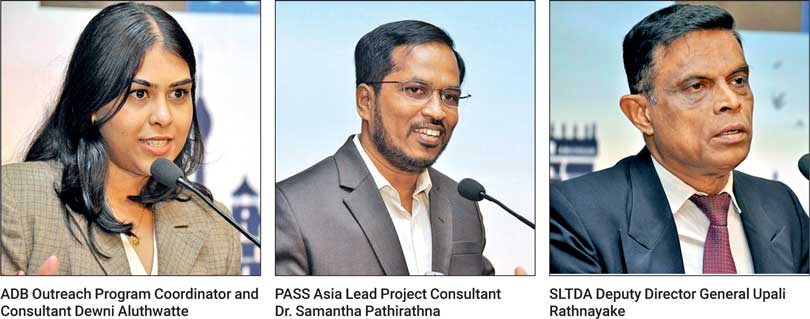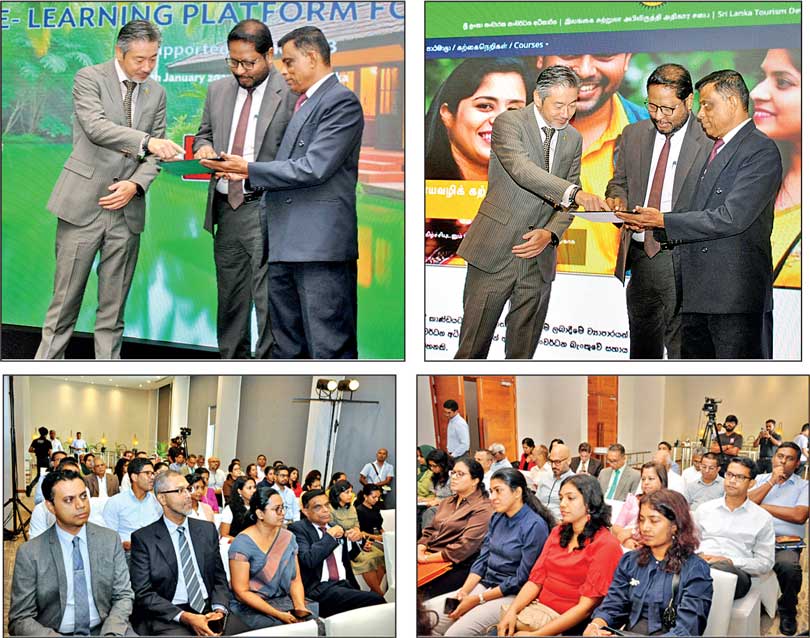Tuesday Feb 17, 2026
Tuesday Feb 17, 2026
Tuesday, 21 January 2025 02:12 - - {{hitsCtrl.values.hits}}


By Janani Kandaramage
In a bid to elevate the standards of the industry, the Sri Lanka Tourism Development Authority (SLTDA), in collaboration with the Asian Development Bank (ADB), recently formally launched the SLTDA e-learning platform for homestays to enhance their knowledge and skills on hospitality, customer service, and brand building.
The launch of the e-learning platform for homestays took place on 17 January at the Jetwing Colombo Seven in the presence of Foreign Affairs, Foreign Employment, and Tourism Ministry Additional Secretary S.L. Nazeer and ADB Country Director Takafumi Kadono.
Commenting on the launch, Additional Secretary Nazeer stated: “We live in an era driven by technology in every industry including tourism. Tourism has always been a dynamic industry characterised by adaptability, innovation, and technological transformations. Weathering the storms of the global pandemic and the economic crisis has demonstrated the industry’s resilience and continuous learning, and this potential highlights the capacity of the industry to be strengthened through digital platforms like e-learning that make it inclusive to many across the country.”
Reiterating the Additional Secretary’s statement, Kadono also remarked on the inclusivity of this initiative, stating: “By eliminating geographical limitations, financial barriers, and language barriers, ensuring that even those from deprived regions have access to state-of-the-art training and facilities from the comfort of their homes, the SLTDA and ADB have achieved a significant milestone in tourism. This will serve as a catalyst for entrepreneurship, with the provision of specialist training and resources on emerging trends such as virtual tourism, digital marketing, and the integration of AI tourism services. Content will also be up to date and tailored to the needs of the tourism sector.”
He also praised the modules for targeting the sector’s potential in becoming a global leader in sustainable and community-based tourism, incorporating lessons on sustainability that will cater to the steady rise in eco-conscious tourists in the country.
The project is a part of ADB’s technical assistance program (TA 9881 SRI: Supporting Tourism Resilience) aimed at supporting the revival of the local tourism sector in the aftermath of the 2019 Easter bombings. The project was, however, not only a tool in immediate crisis management but also a means of building long-term resilience amidst unprecedented shocks.
Identifying the critical role of homestays in driving tourism growth and its vulnerability to sudden upheavals, the ADB and SLTDA developed this e-learning platform to empower homestay operators, especially micro, small and medium-sized enterprises (MSMEs), ensuring sustainability in the sector.
Underscoring the necessity of this initiative, SLTDA Deputy Director General Upali Rathnayake noted that tourism is primarily facilitated by the private sector, particularly the SME sector, which contributes 60-70% to tourism.
“This year, we are expecting 3 million tourist arrivals and just last year we were placed third place in foreign exchange earnings. If we are to sustain this momentum and improve further, we must ensure a consistent flow of resources and support to develop the SME sector which lacks sufficient know-how and funding to grow and attract bookings,” he added.
Outlining the highlights of the program, Rathnayake said: “We have worked with over 120 homestay operators in Kandy, Colombo, and Galle and have conducted a series of online workshops to operators focusing on the fundamentals of digital marketing, equipping them with skills to expand their reach and online presence. With assistance from the ADB, we have also reworked registration guidelines, especially for homestays.”
The e-learning platform designed for homestay owners focuses not only on offering the practical tools and resources required to elevate their expertise, but also offering people greater flexibility in following the courses with its nationwide accessibility.
Crescent Cocoon Galle Owner Theja Ekanayake reiterated the program’s convenience, noting how it allowed her to tailor her studies around her responsibilities as a housewife.
The platform also offers multilingual courses in Sinhala, Tamil, and English and is free of charge ensuring it is inclusive to all, including disadvantaged groups such as women, youth, and those in remote areas, by equipping them with key entrepreneurial skills in homestay ownership.
The e-learning platform comprises the below nine modules catered to address diverse aspects of homestay operations via highly interactive learning techniques, gamification, and practical learning experiences:
1.Start Your Homestay Business (SYHB): A roadmap for aspiring operators, including registration and business setup.
2.Renew Your Homestay Business (RHB): Mandatory for reviewing SLTDA registrations.
3.Improve Homestay Business (IHB): Strategies for improving productivity, optimising operations, digital marketing, guest communication and safety, and financial management.
4.Diversify Your Homestay (DYH): Strategies for creating unique guest experiences and generating additional income.
5.Improve Homestay Business (IHB): This module goes a step beyond module two by prioritising sustainable practices, such as waste management and energy saving, for a profitable homestay.
6.Improve Homestay Business (IHB): Accounting and Finance: Educates on financial management aspects, including budgeting, cash flow, and bookkeeping.
7.Improve Homestay Business (IHB): Safety, Health, and Hygiene: Aims to ensure global standards for cleanliness, employee and customer safety, and food hygiene.
8.Improve Homestay Business (IHB): Guest Communications and Reviews: Focuses on enhancing communication skills, both verbally and written, manage reviews, and build strong guest relations.
9.Diversify Your Homestay (DYH): Goes beyond module four in practically teaching participants to create unique guest experiences as a means of leveraging their income.
The developmental process involved extensive consultations, including a review of existing training programs, literature reviews on global best practices, and a user-centred approach, to ensure the content met the needs of diverse stakeholders in the industry across the country.